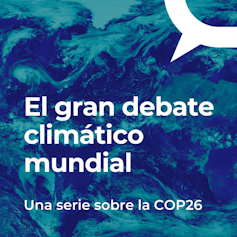
The latest report from the Intergovernmental Panel on Climate Change (IPCC) on Climate Science, released this summer, warns that global warming of the Earth's surface is accelerating. It also notes that extreme weather events, such as heat waves and torrential rains, have increased in frequency and intensity in various regions of the planet.
Scientific evidence indicates, more heavily than in previous assessments, human influence on all of these factors. More specifically, the tons of greenhouse gases released into the atmosphere over the past century.
Emissions reduction will be one of the main topics discussed at the United Nations Climate Change Conference (COP26) , which will be held in Glasgow from October 31 to November 12. As a preview, we asked several experts in industrial organization, agrifood systems, energy, sustainable mobility and architecture what measures we must take urgently to achieve the objectives of the Paris Agreement.
"The vast majority of manufacturing chains are global, so it is not enough to control emissions in a region"
Professor of industrial organization at the Higher Technical School of Engineering of the Pontifical University of Comillas.
There are three main areas of action to reduce emissions from industry. The first is the deployment of a true circular economy, which implies a reduction in the consumption of materials and manufactured products, as well as an increase in their recycling rates. For many materials such as steel or aluminum, their manufacture from recycled materials significantly reduces energy consumption (and therefore emissions).
The second is the commercial development of technologies that allow us to manufacture materials and products without the use of fossil fuels. In the case of already electrified manufacturing processes, the solution is simpler: use electricity from renewable sources. But there are processes (generally the most energy intensive) which are difficult to electrify, and which will require the use of renewable gases such as green hydrogen. And these technologies are not yet competitive, so it will take a lot of research, development and large-scale implementation.
Finally, the most complex area is that associated with certain industrial processes which emit CO₂ regardless of the energy they use. This is the case with cement or fertilizers . To eliminate these emissions, the only option (other than the circular economy already mentioned) is the capture of CO₂ and its incorporation into materials or deposits that prevent its release into the atmosphere in the long term.
It is therefore necessary to act in these three areas, while recalling certain very important ideas. First, investments in industrial processing are high, and also with a very long maturation period. Second, the vast majority of industrial manufacturing chains are global, so trying to control emissions in a particular region is not enough. Third, innovation is also a global process. All this requires policies with a long-term vision and coordinated at the international level.
"In the case of food consumption, the greatest potential lies in adopting diets rich in plant foods and in reducing food waste"
Alberto Sanz Corbeña and Ivanka Puigdueta
Researchers at the Center for Studies and Research for the Management of Agricultural and Environmental Risks of the Polytechnic University of Madrid.
In terms of food production, research efforts to design livestock and agriculture systems that are more resource efficient and with a lower carbon footprint are important.
In some cases, work has focused on the area of biotechnology. Thus, in the livestock sector, the use of methanogenesis inhibitors , which directly affect rumen microorganisms, has been shown to be effective in reducing the methane generated during the digestion of ruminants.
In all livestock systems, improved feeding and management systems for housing and manure can result in reduced emissions per unit of product .
However, it is only if these technological changes or improvements are accompanied by structural changes , both in terms of consumption and in the implementation of ambitious policies, that the emission reduction targets set by the latest IPCC report for could be achieved. Such initiatives should lead, for example, to increasing the proximity between livestock and farming systems in order to facilitate the use of manure as fertilizer.
In the case of cropping systems, in areas at high risk of droughts and heat waves, effective management of irrigation and fertilization is essential to increase their agro-environmental sustainability. Optimizing the use of these resources should lead to adjusting the production of inputs, which depends heavily - even today - on the use of fossil resources.
Ecological and agroecological production systems, strongly linked to the territory (less dependent on fossil resources), could be an important element of progress towards greater sustainability and a lower carbon footprint associated with production , as already reflected by important European initiatives.
In the case of food consumption, the greatest potential lies in adopting diets rich in plant foods and reducing food waste . When we talk about diets based on plant foods, we are not referring exclusively to vegetarian or vegan diets, but also to others such as the Mediterranean diet or the “planetary diet”. These include the consumption of small amounts of food of animal origin and must take into account regional and socio-cultural peculiarities.
Its varias las razones por las que la adoption de dietas ricas en vegetales está asociada a una menor huella de carbono:
-
menor asked for surface area para la producción de piensos para consumo ganadero, lo que implica una menor deforestación y cambios en uso de suelo que llevan asociados una important emisión neta de gases de efecto invernadero y uso de energía para fabricar esos piensos,
-
reducción en el número de cabezas de ganado (reducción en la producción de metano enterérico por la digestión de los rumiantes y menor producción de estiércoles sólidos y purines),
-
consumo directo de nutrientes (sin necesidad de transformación mediante la digestión de los animales), etc.
Para la promoción de esta medida sería conveniente establecer mecanismos that favorezcan la ganadería extensiva, más ligada al territorio, y que corrijan las actuales desigualdades sociales en el acceso a alimentos de calidad.
With regard to food waste, the objective is to avoid emissions linked to the production of food which will never be consumed, and which is therefore thrown into the "bucket" of the atmosphere without producing any benefit in its environment. life cycle. In addition, this measure also aims to reduce the huge amount of organic waste that ends up in landfills, the decomposition of which is associated with significant greenhouse gas emissions.
"The most urgent thing is not to reduce CO₂ emissions, but to stop the deterioration of the biosphere"
Researcher of the Energy, Economics and Dynamics of Systems Research Group at the University of Valladolid
The most urgent thing is not to reduce CO₂ emissions, but to stop the deterioration of the biosphere. Right now, to meet the Paris Agreement targets and prevent the temperature from rising by 1.5 ° C, we would have to reduce our emissions to almost zero overnight. It is very unrealistic.
We are going to live in a warmer world and the question is whether, despite this, it will be a livable world. As scientists such as Margulys , Lovelock, and Castro explain, it is the complex regulatory functions performed by forests, seas and soils that stabilize the climate and maintain conditions conducive to life. Therefore, the most important thing at the moment is to stop the deterioration of the biosphere: only healthy ecosystems are able to avoid the worst consequences of climate change.
To achieve this, we need measures that do not generally appear in the discourse on energy transition. We should ban chemical input farming (which is the main cause of biodiversity loss and erosion) and replace it with biological and agroecological techniques. We must end the loss of forests, end overfishing, drastically reduce the use of plastics, take care of soils and aquifers.
It is only after all this that we can start talking about renewable energy. Because if to reduce emissions based on photovoltaics and electric vehicles, we have to open thousands of mines and occupy thousands of hectares by destroying rivers, forests, soils and seas, we do not avoid at all the destabilization of the climate.
"The current transport model is not sustainable due to the large amount of energy it consumes, whether or not it is of fossil origin"
Professor, expert in electrical engineering and sustainable mobility at Nebrija University
In the field of transport, the first step is obvious: rationalize the use of the vehicle, change our mobility habits. It is as individual, important and necessary a measure as not wasting water or recycling plastic or paper. We have to internalize that the problem with the current model is not just in the type of fuel used, but in the wasted energy that our mobility habits entail.
The model is not sustainable due to the large amount of energy it consumes, whether or not it is of fossil origin. Any energy consumed has an environmental cost. Based on this premise, the rest of the associated measures come: public transport, cycling, teleworking, shared transport, urban transformation, etc.
Recognizing that cars are not going to go away , we should not fall into the mistake of replicating our current model of mobility by switching combustion vehicles to electric vehicles. The generalization of the use of the electric vehicle does not have to be beneficial at the global level in terms of greenhouse gas emissions, because it depends on the electricity mix of each country.
Improving emissions from electricity generation globally is absolutely necessary for the electric vehicle to be sustainable. In this sense, the most reasonable measure would be to promote research on so-called green hydrogen and its role both in the automotive industry and in reducing the use of thermal and cycle power plants. combined.
"As users, we can take into account all these actions aimed at being efficient in energy consumption"
Architect and researcher at the Eduardo Torroja Institute of Construction Sciences (IETCC - CSIC)
In the construction of buildings, we must take into account CO₂ emissions throughout the life cycle, that is to say from the moment they are projected, through the construction phase, and the use , maintenance, recycling and demolition. As users, we can take into account all actions aimed at being efficient in the consumption of resources in general, and in the consumption of energy in particular.
It is important to negotiate with the distribution company an electricity rate based on our domestic needs, the use we make of energy and the times in which we usually interact at home with the devices. For this, it is important to obtain advice, analyze our consumption habits, and look for prices that improve the conditions of these hours. But this should be considered carefully and, if possible, by an expert in the field.
On the other hand, it would be convenient to know the type of power generation. If possible, we should opt for renewable and locally sourced energies. Having renewable energy installations in the home can be very interesting. The investment they need can be large, but you can find incentive programs that allow you to do it in a way that is profitable for us.
Responsible use of energy (and therefore lower CO₂ emissions) can be optimally achieved by using household appliances, which must have the best possible energy rating (minimum labeling A), as well as LED luminaires. These devices must be fully charged, with programs adapted to the load, and optimize the operating temperatures, for example, in the case of air conditioners or the refrigerator.
It is good practice to turn off devices in standby. If we leave the house or while we are sleeping, we can even disconnect the lines from the electrical panel that do not contain appliances or appliances of continuous use, like the refrigerator, for example. In this way, we save energy, reduce the amount of the bill and with it we can also reduce CO₂ emissions.
Sources
1 -

2 -
![]() Pedro Linares Profesor de Organización Industrial de la Escuela Técnica Superior de Ingeniería ICAI, Universidad Pontificia Comillas
Pedro Linares Profesor de Organización Industrial de la Escuela Técnica Superior de Ingeniería ICAI, Universidad Pontificia Comillas
![]() Alberto Sanz Cobeña Profesor e investigador en el Centro de Estudios e Investigación para la Gestión de Riesgos Agrarios y Ambientales, Universidad Politécnica de Madrid (UPM)
Alberto Sanz Cobeña Profesor e investigador en el Centro de Estudios e Investigación para la Gestión de Riesgos Agrarios y Ambientales, Universidad Politécnica de Madrid (UPM)
![]() Ivanka Puigdueta Bartolomé Doctoranda en cambio climático y sistema alimentario, Universidad Politécnica de Madrid (UPM)
Ivanka Puigdueta Bartolomé Doctoranda en cambio climático y sistema alimentario, Universidad Politécnica de Madrid (UPM)
![]() Margarita Mediavilla Pascual Profesora del Departamento de Ingeniería de Sistemas y Automática y miembro del Grupo de Investigación en Energía, Economía y Dinámica de Sistemas, Universidad de Valladolid
Margarita Mediavilla Pascual Profesora del Departamento de Ingeniería de Sistemas y Automática y miembro del Grupo de Investigación en Energía, Economía y Dinámica de Sistemas, Universidad de Valladolid
![]() María Teresa Cuerdo Vilches Dra. Arquitecta. Investigadora, Instituto de Ciencias de la Construcción Eduardo Torroja (IETcc - CSIC)
María Teresa Cuerdo Vilches Dra. Arquitecta. Investigadora, Instituto de Ciencias de la Construcción Eduardo Torroja (IETcc - CSIC)
![]() R oberto Álvarez Fernández Profesor. Ingeniería eléctrica y movilidad sostenible, Universidad Nebrija
R oberto Álvarez Fernández Profesor. Ingeniería eléctrica y movilidad sostenible, Universidad Nebrija
Posted on 2021-10-29 17:51














Comments